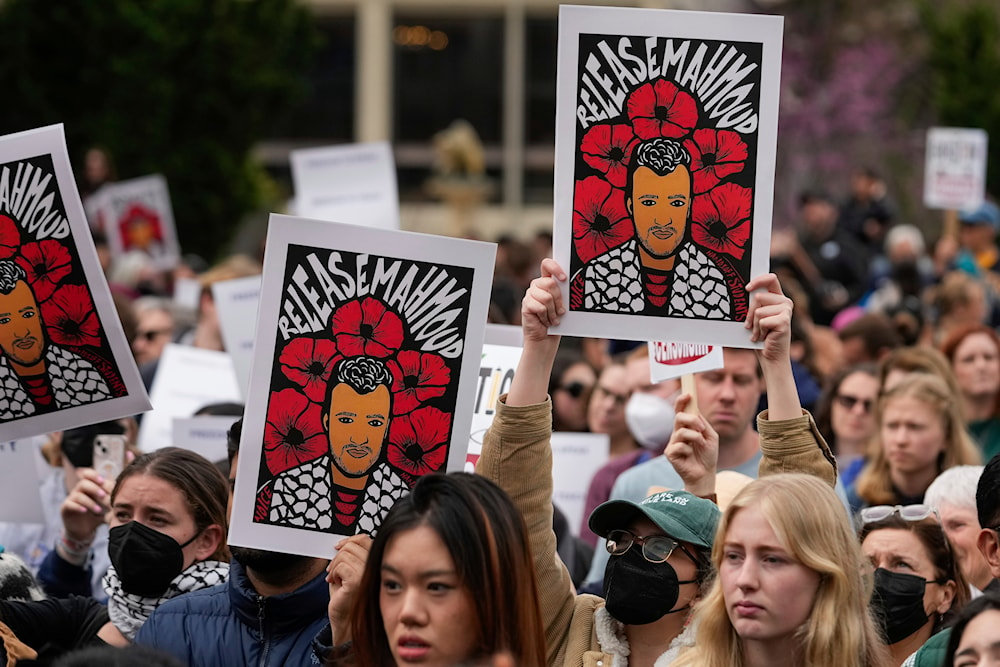French university offers 'scientific asylum' to US researchers
Amid mounting restrictions in the US, columnist Alexander Hurst suggests that Europe has a unique opportunity to position itself as a global hub for scientific and academic excellence.
-

People hold signs in support of detained Palestinian activist Mahmoud Khalil while protesting the Trump administration at the University of California, Berkeley campus Wednesday, March 19, 2025, in Berkeley, Calif. (AP)
In a recent opinion piece for The Guardian, Europe columnist Alexander Hurst explores a bold possibility: Could the European Union not only attract American researchers but also entire US universities?
With 29 American university campuses already operating in Europe, Hurst argues that mounting restrictions on academic freedom, funding cuts, and tightening policies on foreign students in the US could push these institutions to establish second campuses on the continent.
If this trend continues, he suggests, Europe has a unique opportunity to position itself as a global hub for scientific and academic excellence.
The wider context
In six weeks, the Trump administration's "rapid scheduled disassembly" of US science has been as drastic and damaging as its attacks on US alliances and global reputation.
Key areas like Earth science, weather forecasting, early warning systems, and medical research—including cancer research—have all been targeted, along with a wide range of academic grants. Some terms, like "political" and "women," have even been banned in academic work.
This has led universities across the US to cut PhD and medical student admissions, implement hiring freezes, and rescind some offers. Over 12,500 US Fulbright researchers abroad and 7,400 foreign scholars in the US have had their funding suspended, leaving many stranded financially. One foreign academic was even detained and denied entry to the US
The administration has also specifically targeted certain universities, withdrawing $400 million in funding from Columbia University and $800 million from Johns Hopkins, which had to lay off 2,000 staff. Additionally, the arrest and green card cancellation of Mahmoud Khalil is expected to discourage foreign students and researchers from coming to the US.
In the words of Christina Pagel, a professor at University College London, “This isn’t chaos.” The attacks on research appear to be aimed at three main goals: aligning science with state ideology, undermining academic independence, and pursuing geopolitical and economic interests.
A flashback
Historically, the US space program owes much to Operation Paperclip, which brought 1,500 former Nazi scientists, including Wernher von Braun, to the US.
In light of Trump's policies, Hurst said he wondered whether the European Union might capitalize on the situation by reversing the transatlantic brain drain and attracting top US researchers. There is no moral dilemma this time; Europe could welcome these researchers, joined by Canada, Japan, South Korea, Australia, and New Zealand, to uphold "liberal democratic" values.
EU governments are already recognizing this opportunity. For instance, the University of Aix-Marseille launched a €15 million program, Safe Place for Science, to bring 15 American scientists in fields like climate, health, and astrophysics. The university has received over 60 applications, with 30 coming within 24 hours, and it is coordinating with the French government to expand “scientific asylum” across Europe.
In 2024, the US spent approximately $195 billion on research and development (R&D). However, when compared to the US's GDP of $27.7 trillion and the EU's GDP of $26.5 trillion (adjusted for purchasing power), both are economically similar. The EU wouldn’t need to match the full $195 billion in R&D spending; a €25 billion annual investment, less than 0.1% of the EU’s GDP, could be enough to draw top scientists from the US and counter the cuts.
In Hurst's view, it’s a feasible proposal that could eventually pay for itself, as past research showed that non-defense R&D spending returned 200% during the postwar period.
Looking further ahead, the EU could potentially attract not only individual researchers but entire American universities. US universities already have 29 campuses across Europe. If US restrictions on academic freedom, funding, and foreign students continue, these universities, as per the piece, might find it increasingly appealing to establish second campuses in Europe.
Read next: Europe rushes to welcome US scientists fleeing trump crackdown: FT

 4 Min Read
4 Min Read








